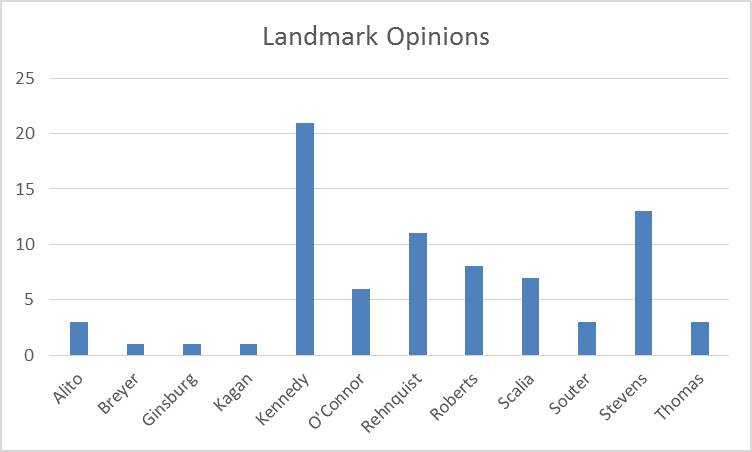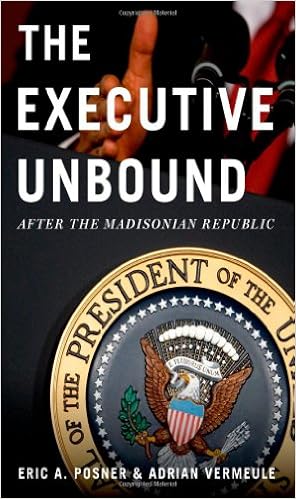If Trump is elected president, will constitutional law and American political institutions protect us from a would-be dictator? Europeans worry about the emergence of Caesarism in the United States, just as the founders did when they invented the presidency. Authoritarianism is making gains around the world; why not here? Of course, Trump may not want to be a dictator. He has repeatedly stated his desire to make “deals,” implying a willingness to cooperate with Congress. But there is no reason to believe anything he says; many of his actions and statements are those of someone with a dictatorial mentality if nothing else, and his popular support derives from his authoritarian image: he appeals to people who yearn for a strongman to protect them. So the question is worth asking. What is the answer?
Let’s consider one of Trump’s proposals: to strengthen libel law so that he can punish those who criticize him. Could he do this? He cannot do it by executive order, and he probably cannot do it even if he persuades Congress to pass a law. First Amendment doctrine is clear: a court would strike down the sort of libel law that Trump advocates (or appears to advocate).
But there are ways that Trump could maneuver around this barrier. If he can appoint flunkies to head the Department of Justice and the FBI (Chris Christie, maybe?), they can order agents to spy on a political opponent and bring prosecutions. All that is needed is a reasonable suspicion of law violations, and there are so many laws that any prominent person, particularly journalists and opposition politicians, might violate even if inadvertently—campaign finance laws, tax laws, business licensing laws, and secrecy laws come to mind, depending on the person’s activities—that an excuse for audit, inspection, or surveillance can be ginned up. Judges can interfere at various steps along the way; whether they do will depend on whether there are plausible reasons to think that the person has broken a law (think of Hillary Clinton, for example). While nothing may come of the investigation, the risk of such harassment, if pursued vigorously enough, may deter opposition to Trump at the margin.
This is not to say that Trump would do any of these things. Exposure of politically motivated investigations could damage him politically; and—a theme to which I will return—lower-level officials might refuse to carry out his plans. But there is a long tradition of this type of behavior, both within our country (Nixon) and without (Putin, to pick one of countless examples).
Trump has other avenues for harassing political opponents—and I confine myself to strategies that are within the realm of the possible as suggested by American political history. But first we need to distinguish two routes to power. In the first, Trump sweeps to victory with enormous popular support as well as the support of the Republican establishment, which finally decides to make peace with him. In the second, Trump barely manages to win the election, perhaps because Hillary Clinton at the last moment is indicted for violating secrecy laws. He comes to power with the support of an enthusiastic minority but opposed by both parties and the majority of the population.
For the first, the model is FDR. But FDR was repeatedly blocked by the courts, as Trump would surely be if he sought to exercise dictatorial power. With the Senate on his side, however, he could appoint Trumpian judges and justices; he could even beat the Supreme Court into submission by threatening to pack it as Roosevelt did. Still, I think none of this will come to pass. Even if Trump is elected, he will not have FDR’s majorities in Congress, or last as long as FDR, or command as much popular support. Working with congressional support, he could do some of the things he says he wants to do—end Obamacare and build a Mexican Wall (assuming that he really wants to do these things, which I doubt). But then by definition he is not acting as a dictator. The possibility that a President Trump uses a temporary political majority to strengthen executive power and demolish the remnants of the opposition, in the manner of Hugo Chavez, is a possibility but not one that is (yet) worth considering.
The more interesting case is the second. A President Trump opposed on all sides by Congress, the courts, the media, and all the rest of the establishment, but supported by an enthusiastic base, could accomplish the great things he imagines only if he exercised something like dictatorial power. At a minimum, he would need to:
— Get his people into the bureaucracy, either as recess appointments or as “advisers” who don’t need Senate approval. If he refuses to appoint moderates demanded by the Senate, his advisers may be able to persuade civil servants to implement Trumpian policies but maybe not.
— Use his personal funds to sue his political opponents, and persuade law enforcement to audit, monitor, and investigate them, as discussed above.
— Impound funds appropriated by Congress and use them for projects like expelling illegal immigrants. This is technically illegal, but presidents have for decades denied the constitutionality of the anti-impoundment statute, and Trump’s lawyers could repeat these arguments.
— Build political support by declining to enforce unpopular laws, for example, the land-use and environmental laws that are so unpopular in the west. He can cite Obama’s immigration enforcement actions as precedent if need be. He can exclude Muslims, at least temporarily, if he wants to.
— Focus on foreign affairs, where he has a freer hand. He can threaten to withdraw military and economic aid to Mexico unless it pays for the Wall. He will give the military maximum support. The military is the most trusted public institution; if he can bring it to his side, he will obtain credibility from the wavering middle.
The first point is the most important. The president acts through other people; Trump cannot accomplish anything unless he can place loyalists in positions of power. If the Senate is unified against him, recess appointments and advisers will accomplish little. If he must compromise on appointments, and independent people become attorney general, head of FBI, and the like, then Trump will not be a dictator.
On the other hand, a president’s patronage opportunities are limitless. If Christie has already fallen in line, many more can be expected to do the same. The president wields a veto and can interfere in countless ways with Congress’ legislative goals. Using his veto and appointment power, Trump may be able to make the deals he cares about—giving the Senate laws and patronage positions in return for approval of the positions that he cares about, the positions in the Justice Department, the military, and the judiciary. Moreover, even if a Trumpian movement remains a minority personality-cult, it could hold the balance of power in a enough states to produce natural allies for Trump in Congress.
The separation of powers is a flimsy constraint on Trumpian ambitions. The federal bureaucracy is probably a more significant one. It has proven itself time and again skilled at opposing presidential power through embarrassing leaks, working-to-rule, simple inaction, and, in extremis, threatening to resign. Still, this barrier may not give much reassurance.
What of political constraints? Trump will need some support in Congress, and if the public detests him, representatives will keep their distance. Public hostility will also strengthen the hand of courts and the bureaucracy. If he is to gain significant public support, he will need a grand success. Taking a page from Putin, he could combine a ruthless military victory against a weak but unpopular enemy (but what exactly?) and extraordinary luck—an economic recovery that just happens to occur when he takes office. But in America, even this is not likely to be enough.
Still, Trump has already done some clever things to immunize himself from future political damage. These tactics have received surprisingly little commentary.
First, he has refused to make promises. More precisely, while he has made a very few promises, he has contradicted himself so many times, no one really expects him to keep those very few promises, or has any idea what he might do as president. Normally, this vagueness would be fatal. For whatever reason, it has worked for Trump. The upshot is that as president, unlike other presidents, he will not be constrained, not even minimally, by promises he made on the campaign trail, and so he can do whatever is most expedient.
Second, he has refused to work through the Republican establishment. Working through the Republican establishment means making commitments to party leaders and supporters, which would constrain his behavior as president. But because he has not made such commitments, he faces no such constraints as president—again, unlike any other president in modern times.
Third, he has disregarded what might be called “political manners.” He has casually insulted Latinos, Mexicans, women, disabled people, and veterans. He has mocked and belittled his political opponents. One might say, as his defenders do say, that Trump doesn’t really mean what he says. But that misses the point. By unsettling the implicit rules of the game which govern our politics, he has further eliminated constraints on his presidency. Will he eliminate affirmative action in federal hiring? Or will he strengthen it? No one knows. Having thrown into doubt the unwritten rules that have constrained other presidents, he has more scope to act as he sees fit.
Many of the informal but powerful ways that politics constrains presidents with authoritarian tendencies will not constrain Trump. Whether that means he will be Caesar if elected remains to be seen. I think the likelihood is extremely remote. It is much more likely that his authoritarian tendencies will clash with a legalistic political culture and an individualistic political culture, yielding disruption and gridlock. But that is reason enough to be alarmed.



 Since we published
Since we published